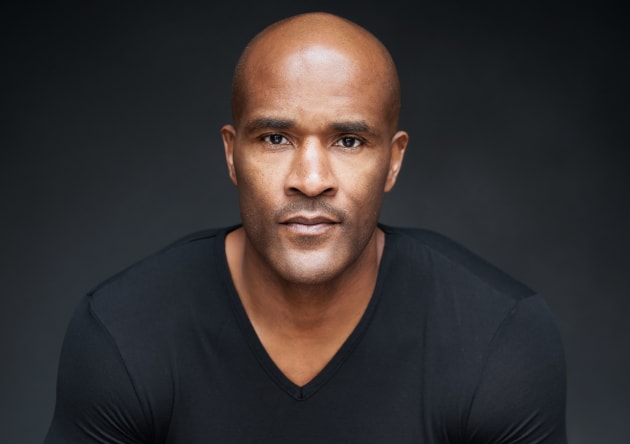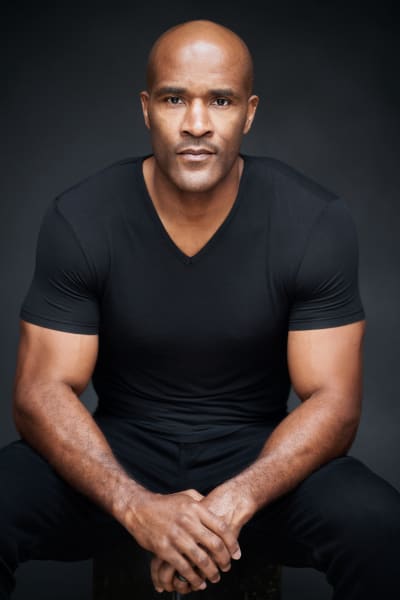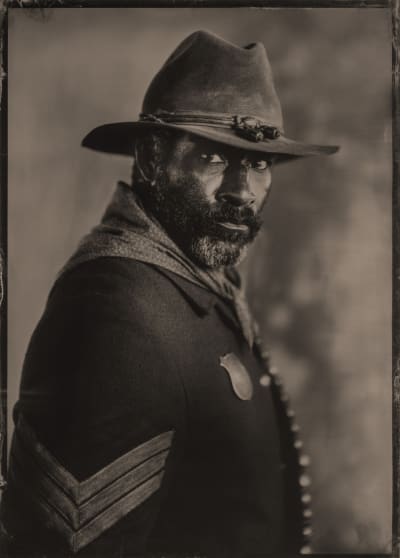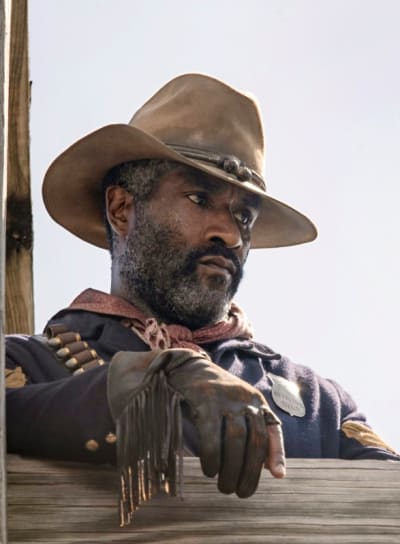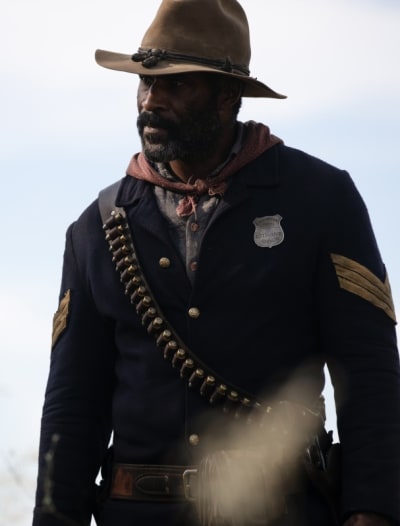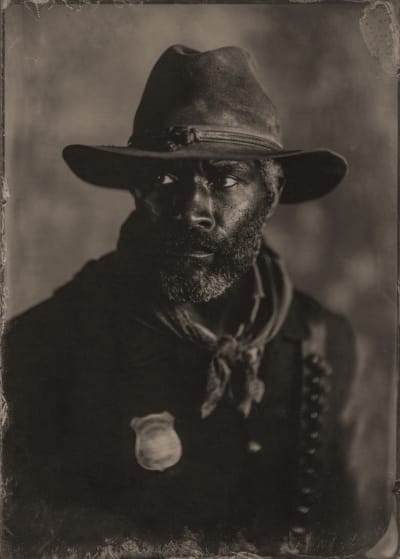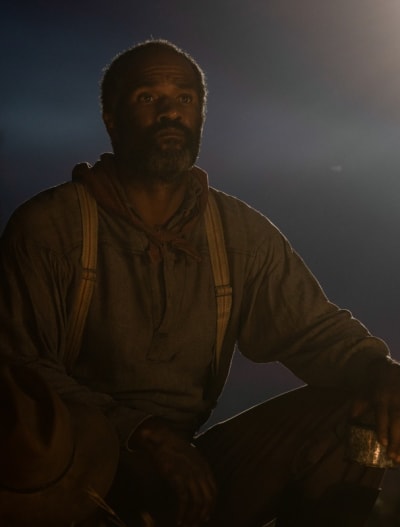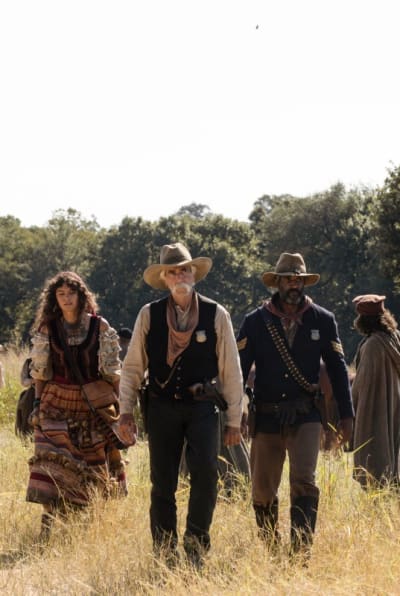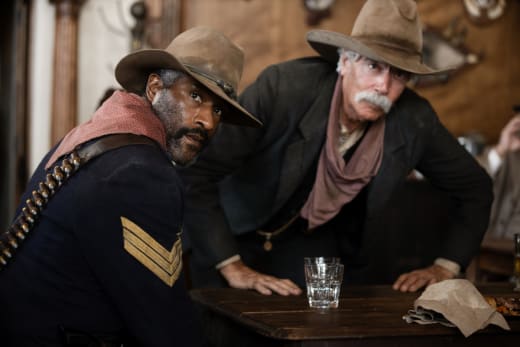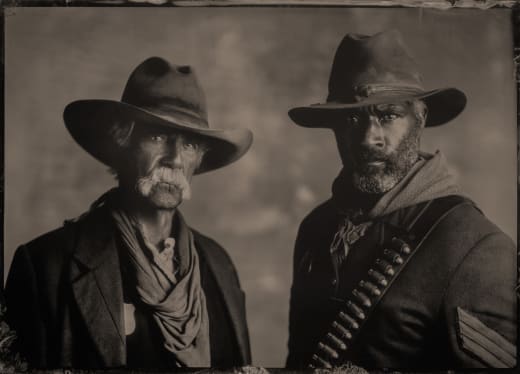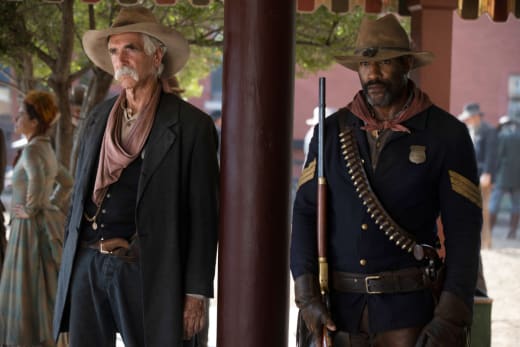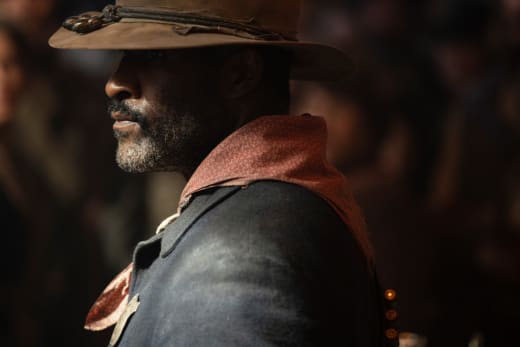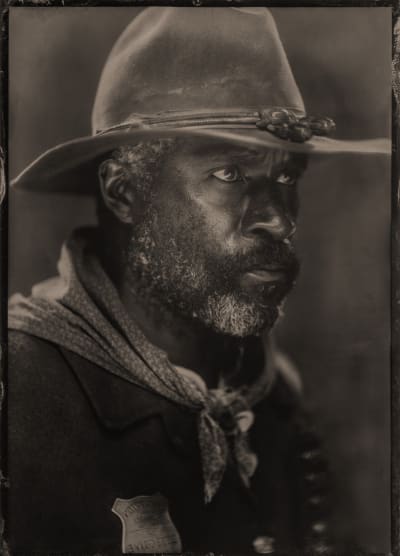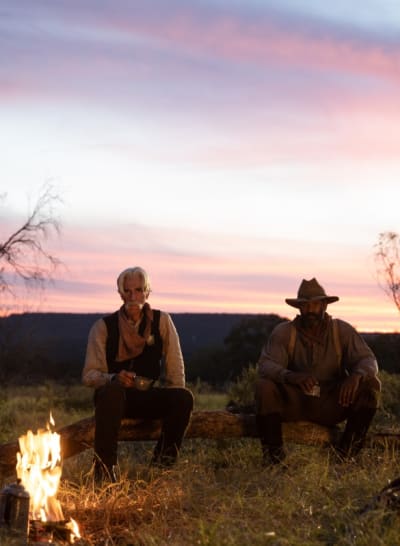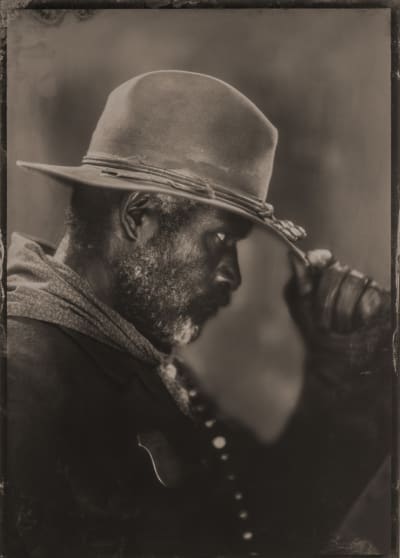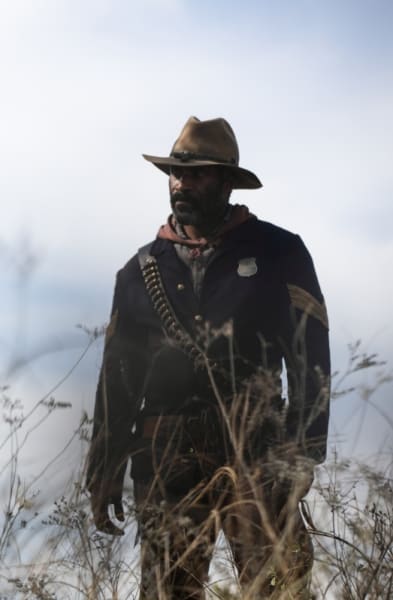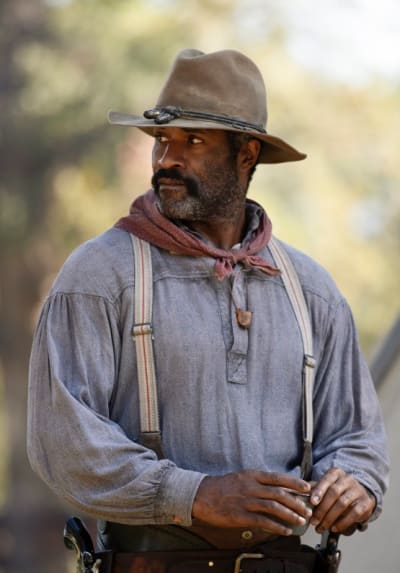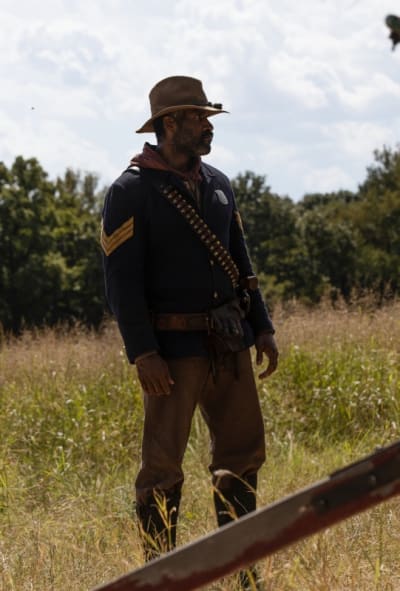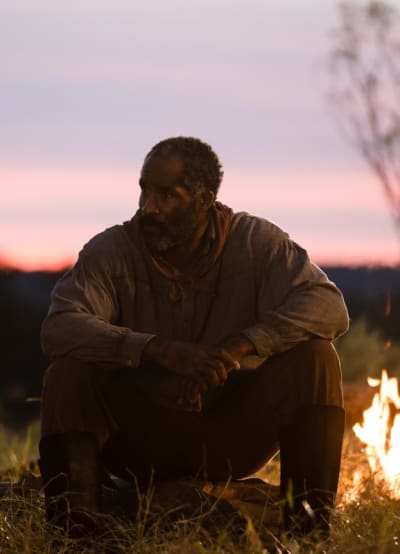LaMonica Garrett stars on 1883 as Thomas, a Buffalo Soldier who, with his partner, Shea (Sam Elliott), has taken on the daunting task of accompanying European travelers north from Texas to Oregon.
Despite a rich history as cowboys, there have been relatively few Black portrayals on TV, and Garrett is honored for the opportunity to play such a significant role, and he’s infusing Thomas with a lot of heart.
We had the chance to catch up with him for a nice chat, and you can read all about it below.
What has surprised you the most about 1883’s reception?
I think that it’s expanding on all sides. Everything right now is made to be political, and it’s either you’re too this, or you’re too that, or there’s not enough of this, there’s not enough of that.
And I look in the comment sections on social media to see the temperature of the room, how people are responding to it, and they might have something to say in the beginning about women representation, or it’s just another western like we’ve seen before.
And then a couple of episodes later, those same people were saying, “Oh, this is refreshing. This is something new.” Like, “Oh, Elsa has pants on now. I didn’t expect this.”
It’s not what you’ve seen before. And if you think you know something about westerns, and if there’s something you don’t like about that time period and how it’s portrayed in older shows, this show isn’t that, and the more it airs, the more all sides are coming around to it.
What are some of your favorite fictional Cowboys in westerns?
I love Danny Glover’s character Mal in Silverado. Yeah. Mal was great. I love William Munny. I loved Doc Holliday in Tombstone. It’s his take. It’s not pitched. Who else? Buck and the Preacher. I loved Poitier’s version of Buck. I love Deets in Lonesome Dove.
Have your views on who you found inspirational before you had this role changed at all from how you feel now that you’re actually a part of the genre?
No, if anything, I grew more of an appreciation for not only what they were before I started reading about them, like reading about Bass Reeves and Nat Love, these black Cowboys that I knew of before, the Bill Pickets.
But when you start reading in-depth of what they went through back in that time, how great they had to be, to be noticed during that time period and how hard it is after learning how to ride a horse and learning the Cowboy culture, how hard it is even present-day for Cowboys right now, it’s not easy.
And back then, everything was ten times as hard because we have amenities now that make things easier for us. Like just the saddles, the saddle I have in 1883; that saddle is small, it’s uncomfortable. It’s not fun to be in, but it was time-appropriate.
The saddle I learned how to ride in Cowboy camp was cushy; it was nice. It was great. And that’s not the saddle I had day in and day out. And when I think back to the Bill Pickets and the Nat Loves and the Bass Reeves, they had the saddle I had in 1883.
And Bass Reeves was tall; he was a bigger guy. And if nothing else, I have more of an appreciation after living it day in and day out in our version of the 1800s.
And you’ve talked about your role and how important it is to Black representation in this genre. What kind of response have you received to your portrayal of Thomas?
It’s been all positive. You don’t know what to expect. You put your best foot forward, you do your research, you do your prep, and you go, and you can do all that, and sometimes it’s not received well for whatever reason, and you can do it, and sometimes you get a great response.
I talked to a couple of people behind the scenes from different aspects of the show, whether it’s Paramount or whether it is producers.
They pretty much told me that the way it was written on the page was something, he was still going to be a significant character, but what I brought to it — the power in silence, his stillness, his soulfulness, his empathy in his eyes — that’s something that the actor brings; that’s not on the page.
And I think that’s something that the audience to eyes through the soul or through the actor’s eyes — the window, and people are seeing the preparation that I put into it, and I’m just glad it’s being received well.
I like that you said how your eyes are speaking. It’s interesting because I think with Thomas and Shea, Shea comes off as gruffer on the outside, and he’s all smooshy on the inside, especially as he realizes the enormity of the task they’ve taken on.
And Thomas tries to push back and not get involved, yet he’s getting involved, whether he likes it or not. How hard is it to play that duality where you know that he doesn’t want anybody to know what he’s thinking, and yet he still has to let some of that permeate, regardless?
I think that starts with the writing. Like Taylor’s writing, it starts and ends with that. It’s written so well. And the pacing of it is so well, and the way they shoot it, they let it breathe. Because a lot of what Thomas and Shea’s interactions are, there’s more said in silence than there is with heavy dialogues.
And these men in that period, they just weren’t talking heads, just waiting for someone to stop talking just so they could speak. They’re silent a lot. They spend a lot of time around the campfire, kind of quiet, but that establishes the kind of relationship they have.
And as far as Thomas playing that duality, I think in that time period, the black man in the 1800s couldn’t speak his mind as freely as we do now.
You have to know that, like Thomas even says, there are degrees of freedom, I’m free, but I still need, I got to have my head on a swivel. There are times when I do speak.
And that’s why, when I think Thomas speaks, it’s profound when he says stuff. It’s for a reason. He doesn’t have wasted movement with his energy. He doesn’t have wasted rest with what he says, and that’s with everyone. He picks his words wisely, and he picks when he tells who what.
And I think that just goes back to Taylor’s writing. And I think it’s fun just the way they shoot that, that they get that time to breathe and let there be air in the scene. And a lot of shows don’t do that.
Why do you think he’s so open with Noemi about race and how he views himself in that place? And they had that discussion about freedom. What do you think it is that’s that allows him to open up with her?
I think they come from similar discriminations, just different parts of the earth. She’s looked at as a gypsy.
There are just so many different immigrants, all smashed together, traveling as one. I think Josef said one episode, “We don’t know each other. It’s not like we like each other. We’re all here. We’re forced to be here in this situation.”
And out of all those groups of immigrants, gypsies are culture. Even the term gypsy was normal, but in today’s society, gypsy is not. They’re Romani. I think he sees something in that where she’s the outcast amongst the sea of her own people, just human beings. And he sees himself as that; wherever he goes, he’s usually one of the only black guys in the room.
So he can feel that. And she has two children and Thomas, the way he grew up, the way he came up when he was 12, he found his slave master in the plantation, in the house; he was dead.
So Thomas just got on the horse, rode off, discovered life, and had to figure it out. He didn’t have role models, didn’t have a guiding situation for him, anyone to help him.
And he even says something to Shea in one of the episodes, “Maybe one of these kids has a kid, and that kid does something that changes the world.” I think there would be nothing more for Thomas than to be a role model that he didn’t have in some children’s life.
Oh, that’s nice. Yeah. I never thought about it like that.
That’s my take on it anyway.
Your take is important.
That’s how I’ve played it. That’s how I have the energy of what’s going on underneath. And that really wasn’t a discussion I had with Taylor when it came to meeting Noemi and her children. But I think that was the energy, the gas that I used to accelerate.
How much more do you know of Thomas’s backstory than we know?
Just a little bit. Me and Taylor had a talk a little bit before I got the role, and we talked a little bit while we were filming, as stuff came on.
If I had questions about something, I would ask him and pick his brain. And he’d tell me a little more about Shea and Thomas, Buffalo soldiers, about what state Thomas was from and how long he has been in Texas and stuff like that.
But it all comes out a little bit more in layers and layers as we go. And the [answers to the] questions I had will be unveiled, or you’ll see more of it if you already hadn’t. But yeah, I do my own backstories with characters, and when I have parts that are missing, parts that don’t fit, I would talk to the writer to help fill in the blanks.
Will we learn more about how Thomas and Shea found each other and why they’ve become so close? Is that going to be uncovered at all?
[laughs] You know, without giving too much away, I’d love to give you a yes or a no right now…
The reason why I brought it up is, in the episode when Shea’s standing by the river crying about what they had just gone through and the lives that they had lost, it seemed like Thomas was unaware of how significantly impacted Shea had been, driving men into battle and as they fell around him.
If he says something like, “So what, these are just some people on a wagon train. You never seemed to care as much when you were sending them to their deaths at war. And Shea’s like, “Yeah, you just missed it,” kind of a thing. So that led me to believe that maybe they aren’t quite as close as I had anticipated.
The bond you build during battle is one thing. And the bond you build after you leave all that behind is something else. Day in and day out. Thomas and Shea just get each other; they let each other be themselves.
You have friends that pry and just need to know everything, what you’re thinking right now, and these two men in this story, that’s not them. If you feel like talking, if you feel like giving something, if you’re going through something, I’m here for you, but I’m not going to pry.
And that scene, with the director, I had a question; we played it a few different ways.
And part of Thomas for me, when I saw Shea crying for these people, I had brothers that died on that hill, back during the war. I had people that I considered brothers before Shea that just ran in blindly to their deaths, and I didn’t see you crying for them.
So it kind of gave Thomas a bit of a chip on his shoulder. Like, “No, you never cried for my brothers. Why are you crying for these people?”
And we took down some of that back and forth during the takes. And the one they showed was the one they showed, but that was the energy behind that. But I think, just a lot of what these two men share, their bond together is that they don’t force each other to speak unless you really got something to say.
You just let them be. Thomas knows Shea is a little hotheaded; he’s temperamental, and he let Shea be himself. And if anything, when you’re done doing that — even in the opening episode — “if this is what you’re going to do, do it before the sun goes down, because it’s getting hot out here. Are you coming?”
That was good. And another scene that I loved was when Shea was having a nightmare, and he asked Thomas, “Why don’t you have nightmares?”
And Thomas’s reaction was, “Because things were so bad that sleep was the only place that we could escape.” And the difference to Shea is he is hounded by his mistakes in his dreams, whereas to Thomas, sleep was a refuge. What was it like filming that scene? It was very powerful.
A lot of the interactions with Thomas and Shea are powerful. They’re campfire scenes, and that scene did have a lot of weight in it. Those words had a lot of weight. There’s a lot of history behind those words.
And talking to Shea, that goes back to the point that they discuss a lot of things, but they might not go into detail about each other’s histories. It might be a third rail kind of thing. It might be something they don’t want to talk about, then it surfaces.
And I think Thomas is fully aware of the time and how he’s looked at by certain people in this time, but he doesn’t let it get to him, and he doesn’t live with it. And even saying that to Shea, Thomas says, “I went to sleep. I wasn’t scared of nightmares; I went to sleep to escape ’em.”
And it wasn’t a woe-is-me moment. It’s just matter-of-fact; this is our life. And “Hey, I made some coffee. We got to get the day going.” That’s how they have to manage. You have to get up each day. You can’t have a victim mentality. You have to focus on what’s ahead right now.
And I think that goes back to the writing, too. It’s too easy, and it’s kind of boring to play in a woe-is-me mentality.
I think what’s interesting is people fighting the situations that they’ve been a part of that aren’t positive, and that life wasn’t fair to them, the story of them making it above that and being something bigger, despite the odds that were against them is interesting. And that’s what people gravitate to.
Do you know whether or not they had done more of these wagon trains, or is this the first one they’ve done?
I haven’t talked to Taylor about it, but I think this is the longest, the biggest undertaking they’ve done. I think they’ve done these wagon trains on the shorter period, but not all the way to Oregon.
I think they’ve done this trail on their own before, but not with the responsibility of everyone that they had with them. And even Shea, he says, “I want to see it one last time” they’d been there before.
Right. That’s what I wondered, if it was them alone or if they had taken other people, but it seems like it was something they did on their own.
Yeah. I think it was something they did on their own, and now a whole new set of circumstances and problems and biting off more than you can chew kind of thing when you’re caring for over a hundred people when you’re responsible for their lives.
And Thomas told Shea in the beginning, “We shouldn’t go, we haven’t even left Texas, and they’re falling out like flies. This is a big responsibility. This isn’t kind of what we do. Usually, it’s just us.”
And we can fight any battle with the best of when it’s just us. But when you go somewhere and leave the camp, people are dead, and that’s kind of on your watch, but you can’t be everywhere at once.
So I hadn’t talked to Taylor about it when we were filming. And I don’t think they’ve done this trip with a bunch of other people too many times.
I think they’ve made this trail on their own, that they know the terrain. They know how to get to where they’re going. It’s just a different level of traps and red flags when you’re traveling with people that have no skillset that’s prepared them for this journey.
And what can you tease about Thomas’ future as the season continues?
It gets tricky. You want to talk about so much more like this conversation after episode, whatever, after the end of the season would be a whole fun and open.
And, but I just without saying too much, it’s like I said before, this character art in this genre and TV westerns past wasn’t really… You didn’t really see a lot of people that look like me to have this story of Thomas.
This 360 character is well-rounded. He can do this; he can be the hero over here; he could save the children over here. He could have heart-to-hearts. He has this wisdom to him. He has this soulfulness, this humanity. He has hope. He has this hope to him.
And I think in a world that’s just dark and there’s not a lot of bright lights in places, he’s able to see the cracks of hope where they shouldn’t be seen.
And especially coming from him, where he’s probably been through more in this time period amongst this group of people than any of them, and he’s the one that still has the hope, and “I just think the future’s going to be bright. We just got to keep going.”
And that’s just interesting to me that this character and the more you learn about him, the more you see why he has hope and why he fights the way he does his moral compass is unmatched.
And you also have the Terminal List coming out. Is that going to be a limited series, or is that going to be a multiple-season series?
I think it’s going to follow all the books. Jack Carr has a series of books.
OK. That’s what I thought.
Yeah. That’s Reese, Chris Pratt’s character. He’s that Terminator kind of guy. He’s that tough dude that handles the situation. The show is going to be so great. It’s so well done.
And there are so many people in front and behind the camera that are former Navy Seals, from the writer of the books to the people in the room, the writers in the room, the stunt guys, some of the actors on the show, the camera guys. Like there’s just Navy Seals, former Navy Seals peppered all around that set in all different types of capacities.
And that just brings authenticity to it that I don’t think we’ve seen before. And it’s high action. It’s drama. Chris Pratt is a great action hero, and my role is opposite Chris, kind of his mentor, his commanding officer Navy Seal. That was a really fun project to do. And I can’t wait for that to start airing.
Well, you have such a juxtaposition there. There you are in the 1800s playing a Cowboy, and then you’re propelled into a different kind of action, modern-day hero warrior kind of guy. How are you going to keep that up?
People might not recognize me. Thomas has all this facial hair, and he’s just… Like he said, he sleeps outside, and he bathes in a river. Bill Cox on Terminal List he’s the opposite. He’s clean-cut, clean-shaven. He lives by this certain… His bed made tight every morning. He’s well put together.
Well, like at 6:35 PM, this is what he’ll be doing. He lives on a calendar. Physically, people might not recognize me, but it’s fun to just jump all over the place and play different roles. We’ll see; hopefully, there’s more to come, but it’s been amazing so far.
LaMonica Garrett can currently be seen as Thomas on the Paramount+ series every Sunday, and he’ll soon be starring opposite Chris Pratt in Amazon’s The Terminal List.
And don’t forget to join our Facebook group, 1883 Yellowstone 6666 Extravaganza! to keep the conversation going.
Carissa Pavlica is the managing editor and a staff writer and critic for TV Fanatic. She’s a member of the Critic’s Choice Association, enjoys mentoring writers, conversing with cats, and passionately discussing the nuances of television and film with anyone who will listen. Follow her on Twitter and email her here at TV Fanatic.
